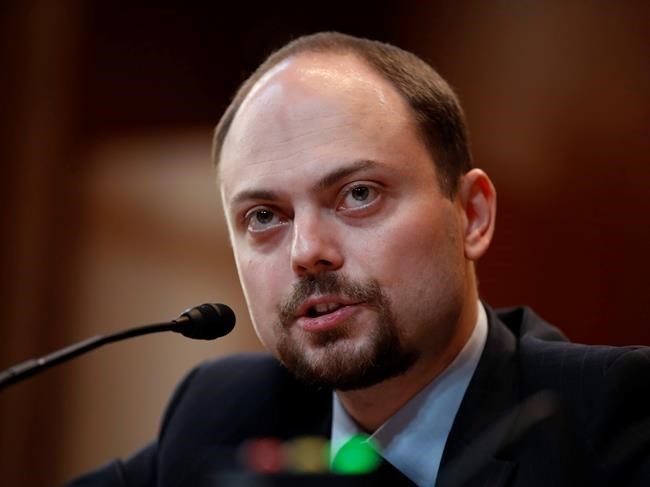
Vladimir Kara-Murza, a vocal critic of Russian President Vladimir Putin, testifies on Capitol Hill in Washington, Wednesday, March 29, 2017. Canadian senators have joined their House colleagues to bestow honorary citizenship on the now-jailed Russian opposition figure. THE CANADIAN PRESS/AP, Manuel Balce Ceneta
Republished June 14, 2023 - 8:17 AM
Original Publication Date June 14, 2023 - 6:36 AM
OTTAWA - Parliament has voted to bestow honorary Canadian citizenship on jailed Russian opposition figure Vladimir Kara-Murza.
The Senate voted Tuesday night to recognize the prominent Russian journalist and activist, following a House of Commons motion last Thursday.
"The worst thing that can happen to political prisoners is that we forget about them," Quebec Sen. Pierre Dalphond said in an interview.
"We want to show we are with him, we're thinking about him and the Kremlin won't be able to make him disappear."
Kara-Murza, a prominent journalist and activist who has helped lead a political party in Russia, was charged in April 2022 with "spreading deliberately false information" about the invasion of Ukraine, which Moscow prohibits calling a war.
He is serving a 25-year prison sentence despite a serious health condition.
Before the war, he had testified in Canada to help MPs and senators reform Ottawa’s sanctions regime to take a tougher stance against the Russian government.
Advocates alleged Kara-Murza was poisoned by Russian state actors upon returning to his country after testifying to the House and Senate in 2016 and 2019.
"He was brave enough to return," said Dalphond, who tabled the Senate motion.
"He could have stayed outside Russia after he survived the second poisoning, but he decided to fly back to Russia and to oppose Putin and his regime."
The House of Commons motion also passed with unanimous consent after it was tabled by Conservative citizenship critic Tom Kmiec.
In a statement, Immigration, Refugees and Citizenship Canada stressed the honorary designation is symbolic and does not bestow the benefits of normal citizenship, such as consular services, a passport, voting rights or the ability to run for office.
"It is important to note that the decision is political in nature, is made by joint resolution of the Houses in Parliament, and falls outside the responsibility of IRCC and the (immigration) minister," wrote spokesman Jeffrey MacDonald.
"As the decision is purely symbolic, no further statements or declarations will be made beyond the (House of Commons) motion."
Former attorney general Irwin Cotler has argued that honorary citizenship sends a message of support to all Russians detained for speaking out against the full-scale invasion of Ukraine, with the Russian human-rights group OVD-Info saying more than 20,000 people are in that category.
Russia's ambassador in Ottawa, Oleg Stepanov, has argued the move gives parliamentarians "15 seconds of limelight" with no other impact.
Kara-Murza's wife Evgenia told CNN on Tuesday that her husband spoke that week with their children for the first time in a year, after Russian officials insisted he could not have a phone call with them because they live in the U.S.
Parliamentarians last voted to grant someone honorary citizenship in 2014, and Pakistani women's activist Malala Yousafzai accepted the honour three years later in Ottawa.
Kara-Murza is the seventh person offered honorary citizenship.
Another was prominent Myanmar politician Aung San Suu Kyi. MPs voted to revoke her designation in 2018 over her complicity with persecution against Rohingya people, which the House also recognized as genocide.
Most recipients, perhaps all, have received a certificate from a senior Canadian official, often in Canada but sometimes abroad. However, it is unclear whether this will be possible for Kara-Murza during his incarceration.
This report by The Canadian Press was first published June 14, 2023.
News from © The Canadian Press, 2023